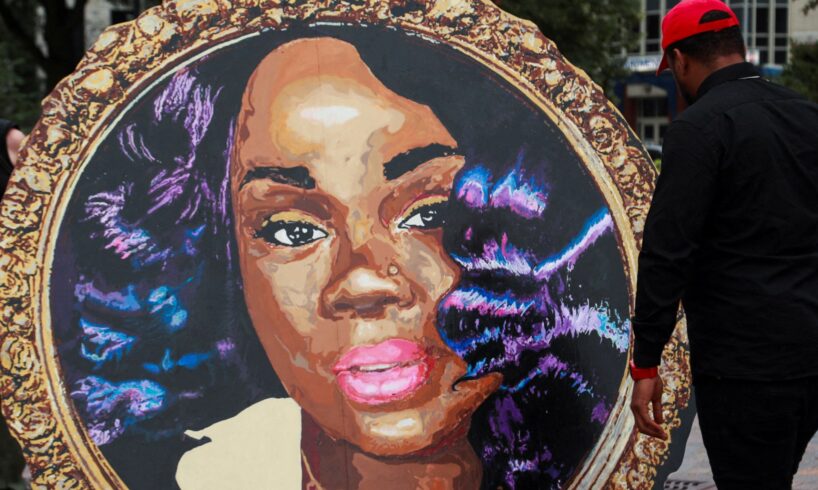
The United States Department of Justice has requested that a former police officer involved in the fatal shooting of Breonna Taylor be given a prison term of a single day, plus three years of supervised release.
That reduced sentencing recommendation marks a stark reversal for the prosecution, which began under former President Joe Biden and continued under current President Donald Trump.
On Wednesday, Harmeet Dhillon, a Trump appointee serving as assistant attorney general for civil rights, submitted a court memorandum reflecting the government’s new stance.
She argued that former police officer Brett Hankison should not be confined to prison for his actions in the early morning hours of March 13, 2020, when Taylor, a 26-year-old emergency room technician, was shot to death in her apartment.
Dhillon noted that Hankison had no criminal history before November 2024, when a federal jury found him guilty of using excessive force in violation of Taylor’s civil rights.
These facts, Dhillon wrote, “demonstrate that there is no need for a prison sentence to protect the public from the defendant”.
“For the reasons explained in this memorandum, the government requests a downward variance and a sentence of time served (one day’s imprisonment), followed by three years of supervised release.”
But critics blasted the recommendation as disregard for the will of the jury — not to mention for Taylor’s life.
“The fact that Donald Trump’s DOJ thinks Breonna Taylor’s life is worth just a one-day jail sentence is morally reprehensible and deeply insulting,” wrote US Representative Morgan McGarvey, a Democrat whose district includes Louisville, Kentucky, where Taylor was shot to death.
“This is a dark day for our entire city.”
A national outrage
Taylor’s killing at the hands of police officers in Louisville was a galvanising moment in the US, sparking debate over the use of police force in Black communities.
It came just weeks before another unarmed Black person, George Floyd of Minnesota, was murdered by a police officer who knelt on his neck for more than nine minutes.
Video of that incident — along with the news of Taylor’s killing and other deaths — provoked nationwide uproar, leading to one of the largest protest movements in US history.
Taylor had been at home just after midnight local time, when a group of plain-clothed police officers arrived at the apartment where she was staying with her boyfriend, Kenneth Walker.
The officers executed a so-called no-knock warrant, attempting to storm Taylor’s apartment unannounced, based on faulty evidence that her apartment was involved in a drug operation.
Upon hearing the commotion, Walker said he believed he and Taylor were the targets of a home invasion, and he shot at the suspected intruders in self-defence.
A pair of police officers returned fire in the doorway. Approximately 22 bullets were fired into the apartment, several of which hit Taylor, killing her.
According to Justice Department prosecutors, Hankison then fired 10 more shots into the apartment through a window and sliding glass door, both of which were covered by curtains and blinds. They note that he could not see inside as he fired.
None of Hankison’s bullets struck Taylor, a fact Dhillon noted in this week’s court memo. Hankison has testified that he believed his police colleagues were engaged in a gun fight with a semiautomatic rifle, and he fired through the side of the apartment to help in their defence.
A shift in policy
Given the outcry surrounding deaths like Taylor’s, the administration of former President Biden had opened aggressive investigations and led prosecutions to hold police accountable for instances of excessive violence.
In December 2024, for instance, the Department of Justice announced it had reached a court-enforceable agreement with the Louisville Metro Police Department (LMPD) to reform the force’s practices.
That agreement stemmed from a March 2023 report that found a pattern of federal civil rights violations under the LMPD, including the use of excessive force and unlawful search warrants.
“An LMPD leader told the department, quote, Breonna Taylor was a symptom of the problems that we had for years,” then-Attorney General Merrick Garland said in a prepared video statement in 2024.
“The findings of our investigation, which I came to Louisville to announce last year, made that clear.”
But since taking office in January, the Trump administration has rolled back the federal government’s agreements with police departments found to have committed patterns of civil rights violations.
One of the cancelled deals pertained to Louisville. Dhillon, at the time, called those reform agreements an example of “federal micromanagement”.
In this week’s court filing, Dhillon wrote that she did not dispute that Hankison fired blindly into Taylor’s apartment on the night of her killing.
She also said that the government “respects the jury’s guilty verdict” in Hankison’s case.
But she nevertheless pointed out that Hankison had been acquitted of state-level charges, and his first federal trial ended in a mistrial in November 2023. Federal prosecutors retried the case the following year.
Dhillon underscored that Hankison did not fire the fatal bullet.
“Counsel is unaware of another prosecution in which a police officer has been charged with depriving the rights of another person under the Fourth Amendment for returning fire and not injuring anyone,” she wrote.
Outrage over recommendation
But the recommendation that Hankison’s sentencing be dropped to a single day has reignited the outrage around Taylor’s killing — and the mourning for a young life cut short.
In a statement on Thursday, the civil rights lawyers who represented Taylor’s family, including Ben Crump, issued a joint statement denouncing Dhillon’s sentencing recommendations as farcical.
“This recommendation is an insult to the life of Breonna Taylor and a blatant betrayal of the jury’s decision. Every American who believes in equal justice under the law should be outraged,” they wrote.
“This sets a dangerous precedent. When a police officer is found guilty of violating someone’s constitutional rights, there must be real accountability and justice. Recommending just one day in prison sends the unmistakable message that white officers can violate the civil rights of Black Americans with near-total impunity.”
Hankison faces a maximum sentence of life in prison for his role in the fatal shooting.





